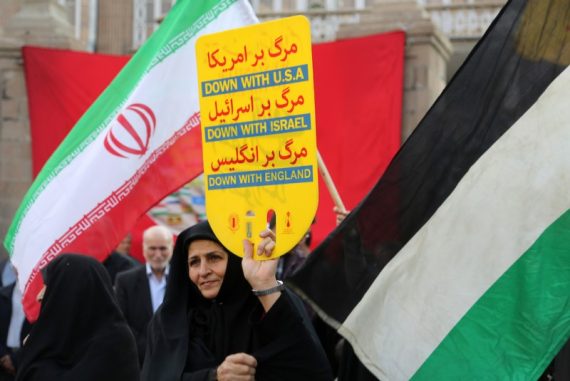I
ran has recently been perceiving Turkey, which will have a land connection with the Turkic republics as a result of the opening of the Zangezur Corridor, as a growing threat, with anti-Turkish sentiment increasing rapidly in the country. Since the beginning of the Second Karabakh War, there has been an intense campaign against Turkey and especially President Recep Tayyip Erdoğan in the Iranian media.
The neighborly relations between Turkey and Iran have a complex dynamic that goes beyond mere geopolitics, geoeconomics, identity, and elite preferences. The bilateral relationship is characterized by two simultaneous but opposing trends: competition and cooperation. The two countries’ respective governments aim to maintain the fine line between competition and cooperation through a strategy of compartmentalization to distinguish between conflict and reconciliation. This rivalry plays an important role both in the context of bilateral relations and at the regional level, while the two countries compete for power and influence in the Middle East, Central Asia, and the South Caucasus.
Another dimension of the Turkey-Iran rivalry is domestic security and regime security concerns. Perceptions of various ideological trends such as neo-Ottomanism, Pan-Turkism, political Islam, Persian nationalism, or sectarianism have been perceived over time as threats to regime security. These perceptions have hampered efforts to forge a strategic partnership, even on issues where interests overlap. In this context, the AK Party governments have sought to improve Turkey’s relations with Iran for a variety of economic, strategic, and political reasons. By implementing strategies of rationalization, institutionalization, and compartmentalization, they have facilitated the steady development of relations between the two countries.
However, in the aftermath of the Arab Spring and the Syrian Civil War, a new area of conflict has emerged. With the Second Karabakh War in September 2020, Turkish-Iranian relations entered a period of cooling and implicit tension due to Turkey’s growing influence and power in the South Caucasus. In particular, the notion that the Turks, who have settled in the Caucasus after Syria and Iraq, are encircling Iran has raised serious fears of pan-Turkism in the Tehran regime. In addition, Iran perceives Turkey, which will have a land connection with the Turkic republics as a result of the opening of the Zangezur Corridor, as a growing threat, and anti-Turkish sentiment has rapidly increased.
Since the beginning of the Second Karabakh War, there has been an intense campaign in the Iranian media against Turkey and especially against President Erdoğan. This trend was also observed in the 2023 Turkish presidential elections. The comprehensive perception operation carried out by Iranian state-owned or state-sponsored media has manifested itself mainly in the form of emphasizing the claim that “Turkey is pursuing a neo-Ottomanist and Pan-Turkish foreign policy.”
After October 7, when the Palestinian issue was brought back to the international agenda with the Israeli attacks on Gaza, the Iranian media developed the discourse of “hypocrisy” to criticize Turkey’s Palestinian policy and its relations with Israel. As the Israeli attacks on Gaza intensified, President Erdoğan’s and Turkey’s increasing expressions of support for the Palestinian people were critically evaluated in the Iranian press as “hypocritical policies.” In parallel with this criticism, news and commentary about Turkey’s continued trade with Israel have been highlighted. In addition, demonstrations against Turkey were organized in front of the Turkish diplomatic missions in Tehran, Tabriz, and Mashhad.
The Palestinian Question in Turkey-Iran Relations
Turkey’s strong support for the Palestinian issue is one of the areas of Turkish foreign policy in the AK Party era that makes Iran uncomfortable. The “One Minute” incident at the Davos Economic Forum in 2009, when President Erdoğan, as prime minister, criticized Israeli President Shimon Peres for Israel’s disproportionate use of force in Gaza, greatly enhanced Erdoğan’s stature as a leader, especially in the Arab world. The May 2010 attack by Israeli troops on the Mavi Marmara flotilla carrying aid to Gaza, in which nine Turkish citizens were killed, was a breaking point in Turkish-Israeli relations.
Erdoğan’s active involvement in the Palestinian issue and his strong positions against Israel have overshadowed Iran’s role in the Palestinian issue which positions its stance against Israel as a strategy to increase its popularity in the Arab world. However, Erdoğan’s active involvement in the Palestinian issue and his strong positions against Israel have led to a decline in Iran’s regional popularity as his popularity has increased.
While Iran, which claims leadership of the Islamic world, used to see the secular regime in Turkey as a threat, it has now begun to see the conservative AK Party government as a challenge to its interests. The AK Party government, which facilitated Turkey’s return to the Middle East, limited Iran’s influence in the region and became popular in the Arab world for its anti-Israel and pro-Islamic policies. In this context, even Turkey’s attempts to mediate the nuclear crisis, which began in 2006 and ended with a nuclear swap deal with Brazil in 2010, were seen in Tehran as Ankara’s quest to increase its influence and prestige in the region. Soon after, in September 2011, when Turkey approved NATO’s Kürecik Radar Station in Malatya, close to the Iranian border, Iran saw this development as a rhetorical opportunity and accused Turkey of installing an early warning radar that would serve to protect Israel from Iranian missile attacks in the event of war.
At the same time, during this period, a discourse began to emerge on the Israeli side that Turkey, under the AK Party government, was increasingly falling into the orbit of Iran and Syria, and was trying to corner Israel by establishing close relations with Israel’s regional enemies (especially Syria, Iran, Hezbollah, and Hamas). Israeli political elites have adopted an anti-Turkish position, claiming that “a new radical northern front has emerged that includes Iran, Iraq, Syria, Lebanon, and Turkey.” In this process, Iran and Israel adopted an accusatory approach by attributing opposite positions to Turkey, while both countries used the same rhetoric of Turkey’s tendency towards “neo-Ottomanist” policies in the region.
Today, as Israel’s attacks on Gaza continue, Iran is criticizing Turkey’s policies out of a sense of rivalry. Although President Erdoğan’s vocal support for the Palestinian cause and his strong condemnation of Israel’s actions are in line with Iran’s position, Tehran continues to perceive Turkey’s actions as more rhetorical than sincere. President Erdoğan told his Iranian counterpart, Ibrahim Reisi, that he wanted Turkey and Iran to have a “common stance” against Israel’s “atrocities” against the Palestinians. However, the cancellation of the Iranian president’s planned visit to Turkey, according to Iranian media, was due to Iranian efforts to pressure Turkey to take a position against Israel that goes beyond political statements.
According to the reports, Iran wants Turkey to reconsider its relations with Israel, cut all political and commercial ties, and take a practical stance in support of Palestine. While the cancellation of the visit was turned into anti-Turkey propaganda in the Iranian press, the spokesman of the Iranian Foreign Ministry issued a belated statement saying that the problem was caused by delays in issuing visas for the Iranian delegation in New York. “Some regional and Islamic countries are expected to use the deterrent tools they have in their relations with the Zionist regime to support the Palestinian people. This expectation is in line with moral and humanitarian principles and reflects the aspirations of the Palestinian people,” stated the Iranian spokesman,
President Erdoğan’s harsher criticism of Israel has led to an increase in critical reports and commentaries in the Iranian media questioning Erdoğan’s consistency and accusing Turkey of playing both sides.
Opposition to Erdoğan Goes Far beyond Criticism
The Iranian media characterized Turkey’s relations with Israel as inconsistent and Erdoğan’s political stance as hypocritical, highlighting Erdoğan’s statements that Israel owes the West and Turkey owes Israel nothing. It also drew attention to the anti-Israeli protests in Turkey and argued that Erdoğan is pursuing a dual strategy to show support for Palestine and to please his base. On Saturday, October 28, after the “Great Palestine Rally” at Ataturk Airport, the Iranian media began to criticize Turkey more harshly. News and commentaries in Tasnim, Tabnak, ISNA, ILNA, Diplomasi-yi Irani, Jami Jam, etc. questioned the sincerity of Turkey’s support for Palestine and criticized Erdoğan’s statements and actions. ISNA news agency went far beyond criticism with the headline “Erdoğan Is Fishing in the Bloody Waters of Gaza.”
Certain Iranian news websites claimed that Turkey’s support for Palestine was symbolic and ineffective, and emphasized Turkey’s economic ties with Israel. There were also insinuations that Erdoğan’s strategy was aimed at gaining an advantage in the race for leadership in the Islamic world and unifying the polarized Turkish society. The Iranian media culminated its criticism with accusations that Turkey was selling Iranian oil to Israel. There were also allegations that the Erdoğan family and some AK Party members were trading partners with Israel. These allegations were attributed to the Turkish media, raising questions about Turkey’s commitment to supporting Palestine.
History is repeating a cycle in which Iran criticizes Turkey for cooperating with Israel. At the same time, Israel accuses Turkey of siding with Iran. Israeli Foreign Minister Eli Cohen said, “The Turkish president is distorting the facts and is once again on the wrong side of history. He is on the side of Iran, Lebanon, Syria and Yemen, which glorified the massacre of Israelis on October 7.”
Leaving aside all the contradictory criticism of Iran and Israel in their assessment of Turkey’s position, the truth is that the Turkish state and people stand with Palestine.
Recommended





